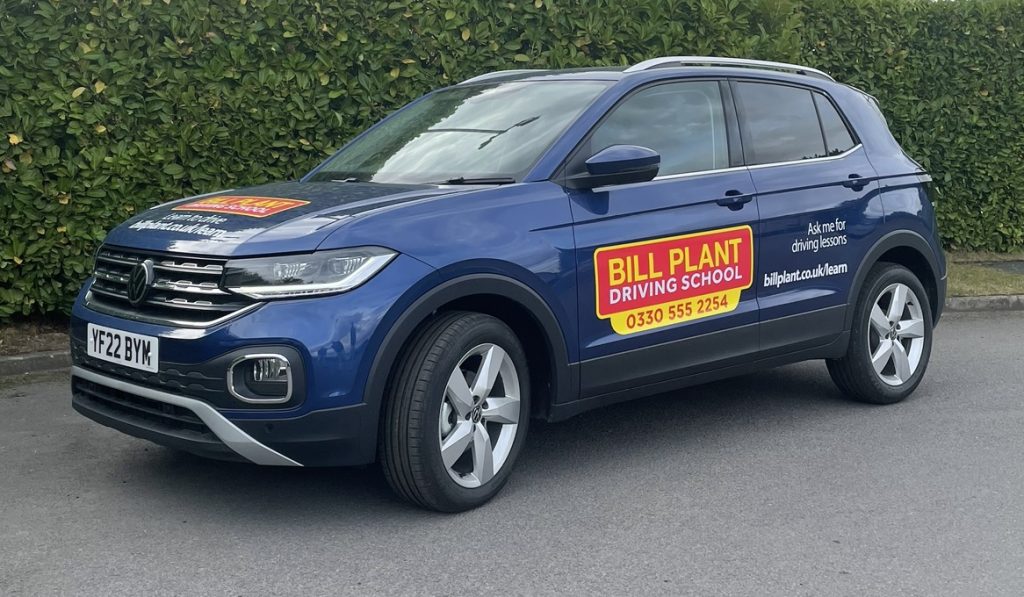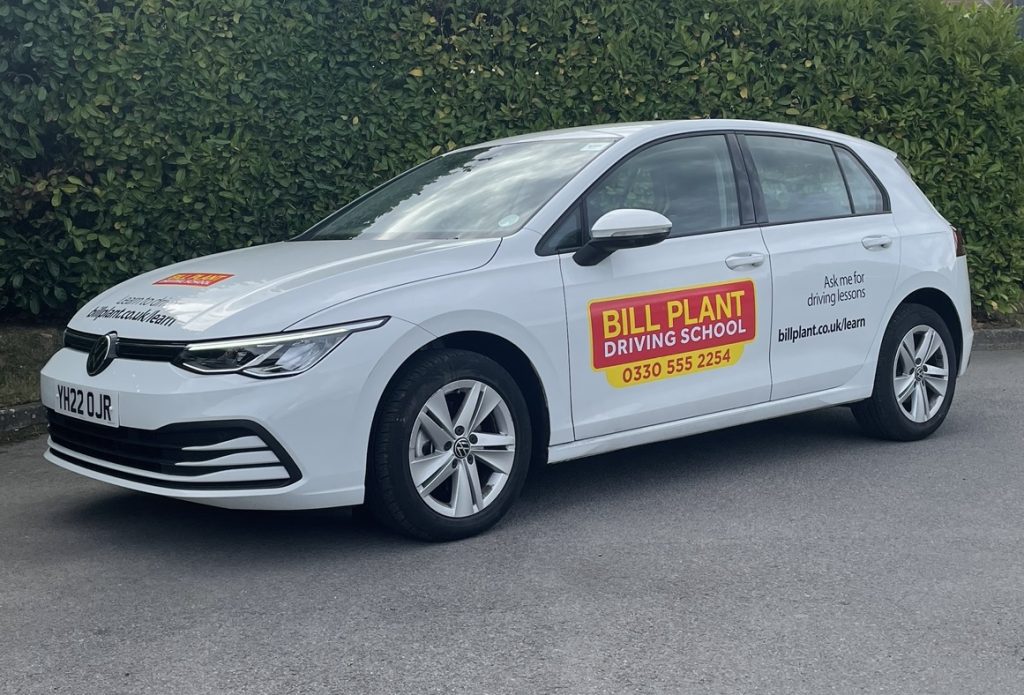
We know that going for your driving test can be daunting! Learning as much as you can during driving lessons prepares you for your test, but this doesn’t stop you from worrying about passing.
The Bill Plant Driving School team has written up some helpful hints and tips to give learner drivers the best chance of passing a driving test the first time.
What are the chances of passing your driving test the first time?
The chance that you’ll pass your driving test the first time depends on several factors. It’s essential to have the right amount of practice and ensure you have the right skills before sitting your driving test. You need to have mastered driving, feel confident in your ability and have excellent knowledge of the Highway Code.
It’s equally crucial to stay calm when you sit your driving test. If you’re as relaxed as possible, you’ll be more confident and focused.
It’s also worth remembering the pass rate varies from test centre to test centre. On average, 49.8% of learner drivers passed their practical driving test in 2020/2021. Even if you don’t pass the first time, you can always resit your driving test.
What are the most common mistakes on the driving test?
Driving test success comes down to more than just luck! With the correct right amount of practice and knowledge, you’ll be in an excellent position to pass your practical test on the first attempt. Follow these top driving test tips below to increase your chances of passing the first time.
Have the recommened 40 hours
It is vitally important that you do not rush into taking your driving test. The DVSA recommends at least
You shouldn’t rush into taking your driving test. The DVSA recommends at least 40 hours of professional tuition before sitting your practical driving exam. Following this will allow you to have the best chance of passing your test the first time, as you will have gained a sufficient amount of practical driving experience.
You should undertake your driving lessons with a professionally trained DVSA registered Driving Instructor as they will coach you through all the aspects needed to learn to drive.
Consider an additional 22 hours of private practice
To help support your learning, it is also recommended that you have at least 22 hours of private practice with someone who is legally allowed to supervise you (i.e. someone who is over the age of 21 and has
To support your learning, it is also recommended that you have at least 22 hours of private practice with someone who is legally allowed to supervise you (i.e. someone who is over the age of 21 and has held their full licence for over 3 years).
While the idea of going out with mum and dad, for example, may seem stressful, the extra hours driving on the road can make all the difference in building your confidence and making you feel more at ease when behind the wheel. When you pass, you may even find the time to owe them a lift or two!
Have regular lessons
You should aim to be having lessons roughly once per week or more. Having regular lessons with an i
Learner drivers should aim to have driving lessons roughly once per week or more. Having regular lessons with an instructor who has completed driving instructor training helps you retain what you have learnt in previous sessions. Additionally, it allows you to be more consistent with your learning approach, with fixed milestones tracked on a scheduled basis. If you have lessons at the same time and day each week, this will help provide you with a more structured learning process.
Practice in different driving conditions
You may be lucky and take a test on a dry, sunny and clear day, but not everybody gets to drive in perfect driving conditions. The best way to make sure you’re prepared is to practise driving in all conditions if possible.
Spend time driving in sunny conditions, rain, fog and during the dark to improve your motoring skills. Even if you do sit a test on a clear day, chances are you’ll drive during more challenging conditions in the future.
Practice each driving manoeuvre
On your driving test, the examiner will ask you to perform one of three manoeuvres you’ll have learnt during your driving lessons. This will be either:
- Parallel parking
- Forward or reverse bay parking
- Pulling up on the right and reversing two car lengths
Make sure you are confident in doing these manoeuvres and have plenty of practice before sitting your first driving test. The examiner may ask you to perform an emergency stop, which tests your ability to stop the car quickly without losing control. The emergency stop comes up in approximately one in every three tests.
Practice the “show me, tell me” questions
You’ll be asked two vehicle safety questions during your practical driving test. At the start of your test, the examiner will ask you one ‘tell me’ question (where you would explain how to carry out a safety task). They will then ask a ‘show me’ question (where you would show them how you’d carry out a safety task) while you’re out on the road driving.
Questions can range from ‘tell me how to make sure the brakes are working’ to ‘show me how you would wash and clean your rear windshield’. Make sure you practice these questions before your test, as an incorrect answer can leave you with a minor driving fault. Use our show me, tell me guide to find a complete list of these questions.
Perfect your mirror checks
One of the most common driving test fails comes down to observations, so make sure you perfect your mirror checks when making manoeuvres, signalling, changing direction and adjusting speed.
Driving examiners will keep checking to see if you’re using your mirrors correctly, which is why it’s vital to make movements clear. Rather than glancing at mirrors, move your head when checking. If it helps, you could also say you’re checking your mirrors as you’re doing it during driving lessons to get you into the right habits.
Ask your Driving Instructor if you are ready
Before booking your driving test, check whether you’re ready for your test yet. Speak to your Driving Instructor and ask for their professional opinion. You’ll also need to check with them that they’re available on the day and time you want to take your test. We understand that you may feel fully prepared, but it is always best to listen to the advice of your instructor and get that first-time pass!
Choose the best test location and time for you
We recommend sitting your driving test in an area that is familiar to you. This way you will already have a basic idea of the areas you will be driving around as well you will more than likely be driving around those areas when you pass.
Picking a test centre in your local area will also allow you to take your test with the instructor and vehicle you have been learning with.
Take a mock test
Ask your instructor to complete a mock test with you on one of your driving lessons. Your instructor will take the examiner’s role during a mock test and ask you to complete the lesson under test conditions. Mock driving tests let you and your instructor know if you are test ready and highlight any areas that need improvement before your test.
Use the car you learnt in for your test
Using your instructor’s tuition vehicle or the car you learnt to drive in will significantly increase your Using your instructor’s tuition vehicle or the car you learnt to drive in will significantly increase your chances of passing your driving test. By using the tuition vehicle you learnt in, you will know all of your reference points for undertaking manoeuvres and have a great understanding of how the car drives. These aspects will help you stay confident as you’ll be familiar with the vehicle.
Have a driving lesson before your test
It’s a good idea to fit another driving lesson just before your test. Doing this allows you to get familiar with the vehicle, build your confidence and get you into the right mindset. You’ll also have the chance to practice any areas you’re worried about and ask questions if you have any.
The vast majority of driving instructors will suggest a lesson before your test, but if they don’t, ask them if they have space for you to do this.
Find everything you need for your test
Another important tip is to remember the things you need to bring with you to your driving test. Before sitting your test, the examiner will need to see your:
- Provisional driving licence
- Theory test certificate
Don’t forget that you need to bring a face-covering with you unless you are medically exempt. If you do not bring any of the above, the examiner will not allow you to take your test, and you will have to rebook at a later date.
Be on time
Examiners have a very strict schedule to keep to, so make sure that you arrive on time, if not slightly earlier than your assigned time slot. Leave yourself enough time when setting off to account for traffic, as if you arrive late to your exam, the examiner may not be able to take you on your test.
It’s good to avoid being in a rush on your test day. If you end up setting off later than planned, this could create unnecessary stress and put more pressure on you during your practical test.
Don’t be afraid to ask the examiner to repeat
It’s likely you’ll have driving test nerves, so don’t feel like you can’t ask the examiner to repeat what they’ve said. Missing what the examiner says is normal, and if you need to double-check the instructions they give you, simply ask them to repeat what they just said. Checking instructions if you’re unsure can help you avoid minor faults.
Relax on your test day
We know that saying “be relaxed on your driving test” is easier said than done! Get a good night’s sleep, take a deep breath and make sure you’ve eaten and had plenty to drink before getting into the car, as this helps to bring your nerves down and keep you focused. Taking the recommended 40 hours of tuition and practising as much as possible will again help you feel more confident in your preparation.
Never assume you’ve failed your driving test
If you feel like you have made a mistake on your exam, do your best not to let it affect the rest of your driving – you should never assume you’ve failed. Take a deep breath and carry on as it is the examiner who decides whether you’ve passed, not you!
Learning to drive is a rite of passage for those seeking to gain independence. By taking your driving lessons with a DVSA registered Driving Instructor, you’ll substantially increase your chances of passing your test, having received professional guidance and support. Start your driving lessons today in some of the best cars for learner drivers by booking online or calling us directly on 0330 555 2254.

